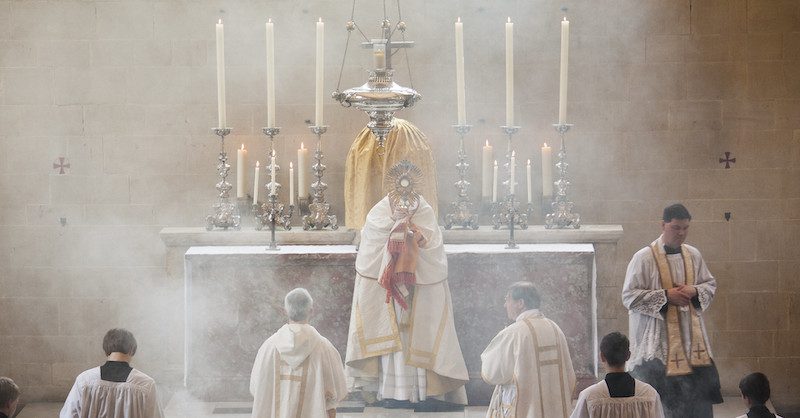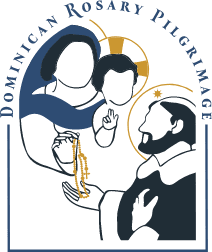Progressive Solemnity
Dominican Friars

June may be the greatest month of the year. School is getting out, temperatures are going up, and the Church celebrates a whopping five solemnities. That’s right, five of the holiest days of the year happen in June: Holy Trinity, Corpus Christi, Sacred Heart, the Nativity of John the Baptist, and Saints Peter and Paul. With all these wonderfully important days in the month of June, it’s a good time to talk about progressive solemnity—a liturgical system ordering our whole hearts and minds to God.
In the Church’s liturgical calendar, certain days are designated to be celebrated in a special way. The greatest of these days are given the title solemnity, in proportion with what they celebrate. These include the Annunciation, Corpus Christi, and Easter, the highest solemnity of the year. Then come feasts, which are reserved for special saints and events, but do not quite reach the level of a solemnity. An example of a feast is the Conversion of Saint Paul, celebrated on January 25. While feasts and solemnities are fairly rare throughout the year, memorials are much more common, recognizing many saints and events. The great month of June begins with a memorial: Saint Justin Martyr. Finally, there are ferial days which do not have a particular celebration (the root feria comes from Latin and signifies “day of the week”). They encourage us to enter more deeply into the current liturgical season, whether it is Lent, Christmas, or Ordinary Time.
Progressive solemnity demands higher celebration for higher occasions, and this is given concrete expression in the liturgy. For example, on feasts, a Gloria is sung at Mass, and on solemnities we recite the Creed as well. Not only that, but the music is often more beautiful, the prayers more distinctive, and the vestments more ornate. Outside of the liturgy, a community or family might enjoy a nice dinner or host an event to commemorate the occasion. Many parishes exemplify this by having a big celebration on their patronal feast day. In fact, when a parish celebrates its patron, that memorial or feast is elevated to the level of solemnity. These elements show that the day being celebrated is for all the people of God—liturgical feasts are not just for clergy or inside the walls of a church, but they add festivity to our whole lives.
Progressive solemnity is quite familiar to us if we think about it. To give an example, a couple’s preparation for their wedding may be painstaking, but the day of the wedding is all the sweeter for it. In the same way, when we prepare for and celebrate holy days with greater care and attention, we actually enter more deeply into the spirit and prayer of the Church on those days. Practices, such as attending Daily Mass and praying the divine office, are great ways to become more familiar with different saints and occasions throughout the year. Following a liturgical calendar online or a publication like Magnificat is also helpful. One way to put this into practice is to pick an upcoming solemnity, and try doing something special to prepare for it: extra prayers leading up to the day, a work of charity, or even fasting the day before. Then, when the day arrives, do something to celebrate: go to Mass, say a rosary, eat some ice cream, or call a friend. These external practices actually help focus our heart on what is being celebrated and enhance our prayer life.
It’s not always easy to feel connected to the holy days throughout the year. Thankfully, progressive solemnity is an easy starting point for anyone interested in living more closely to the Church’s prayer. By practicing progressive solemnity we can better attune ourselves to the rhythm of the Church and so offer our whole minds and hearts to God.
✠
Photo by Fr. Lawrence Lew, O.P. (used with permission)
This article was originally published in the dominicanajournal.org and was written by Br. Roland Wakefield, O.P..
